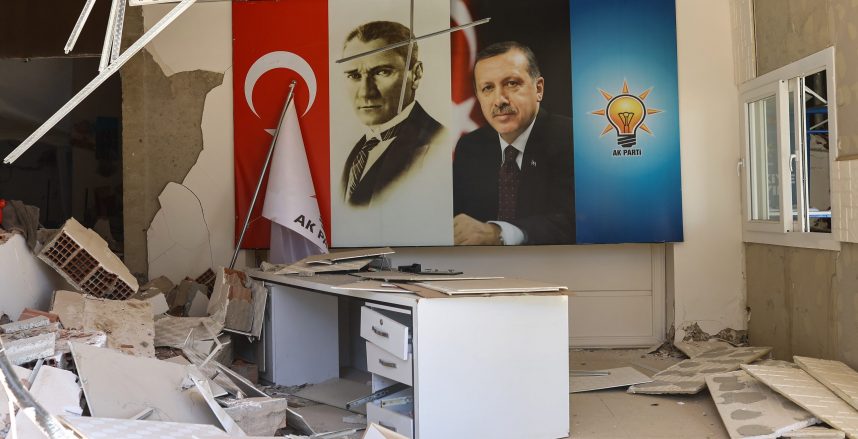
Media experts fear Turkey’s president and government will exploit a state of emergency imposed after devastating twin earthquakes to further restrict media and Internet freedoms before, during, and after upcoming elections.
According to the Media and Law Studies Association, MLSA, at least two journalists were arrested, five detained, four placed under investigation and 12 physically attacked while reporting on the earthquake response between February 6 and 27.
Another 14 were expelled from the affected area by security forces and three TV channels that aired reports criticising the response were fined.
Murat Mumtaz Kok, MLSA communications and project director, said that, “on the very first day”, the General Directorate of Security and the president’s Directorate of Communications began issuing warnings against the spread of ‘disinformation’.
“Unfortunately, it seems that from the beginning the government had priorities other than saving people from under the rubble,” Kok told BIRN. “The very cries of people who lost their homes and their loved ones and asked a very fundamental question, ‘Where is the state?’ were immediately criminalised.”
Arrests, fines

Kok cited the case of Mehmet Gules, a journalist with Mesopotamia News Agency who was taken into custody in the southeastern town of Diyarbakir two days after the earthquakes after he interviewed a search and rescue volunteer who complained that the state’s chief emergency response bodies were not on the ground.
Gules and the volunteer were accused of stirring “hatred and hostility” among the public; after hours in custody, there were released but banned from leaving Turkey on suspicion of “openly disseminating information misleading the public.”
“This and many other examples as well as Mr President’s explicit threats and insults show that the self-preservation of those in power is more important than the preservation of those who still spend their days mostly out in the open and in freezing conditions,” Kok said.
On February 22, Turkey’s Radio and Television Supreme Council, RTUK, the state agency that monitors and sanctions radio and television broadcasts, fined three TV channels – Fox TV, Halk TV and Tele 1 – between three and five per cent of their monthly advertising revenue due to the critical tone of their coverage. A number of specific programmes were temporarily suspended from broadcasting.
“It truly is heart-breaking that in the aftermath of such a catastrophe, the primary target of the governing alliance remains to be the editorial independence of news organisations, and more generally media freedom and the society’s right to access information,” said Gurkan Ozturan, Media Freedom Rapid Response coordinator at the European Centre for Press and Media Freedom.
Threat to free elections

The authorities have not stopped only at traditional media.
Also on February 22, popular social media platform Eksi Sozluk – known as Turkey’s Reddit – was blocked by the government and accused of “spreading misinformation about the earthquake”.
The platform said it would challenge the decision in court.
Complaining again about “misinformation”, the government also restricted access to Twitter and TikTok and slowed down the Internet. Access was restored the next day following a public outcry, with critics accusing the government of cutting off vital communications channels for survivors, relatives of those who died, and aid campaigners.
So far, police say 441 people have been investigated, 129 people detained and 24 people jailed over “provocative posts on social media platforms concerning the earthquakes in order to create fear and panic among the citizens.”
The crackdown is in line with the government’s ever tighter control over media and Internet freedoms under Erdogan via several draconian laws and regulations.
With elections a matter of months away, experts fear authorities will pursue the crackdown further under the cover of the state of emergency declared after the earthquakes.
“When we see such threats, detention of journalists, throttling of access to Twitter and fines being imposed on the TV stations as well as censorship orders targeting minority publications, it hardly looks solely like an attempt to manipulate the discourse around disaster management but raises suspicions whether this is a move from an election-focused perspective,” Ozturan told BIRN.

Pollsters say Erdogan and his government, already facing a significant challenge to their hold on power, are likely to see a further drop in popularity due to their handling of the earthquake response.
“Considering the threats and actions that have taken place so far, there are no guarantees that these restrictions and violations will not take place during the election period, before, during or after the Election Day, also under the light of the ongoing state of emergency in the region, Ozturan warned.
Kok, from the MLSA, agreed: “The fact that freedom of expression – which was literally used to hang on for dear life – is considered by the government to be an existential threat makes the picture all the more bleak” in the context of imminent elections.
“Millions of people forced to stay in almost completely destroyed cities and which are now under a state of emergency will be expected to make an informed decision at a time when those in power now have all ‘legal’ grounds to cut off the flow of information if that information is deemed dangerous by those in power.”